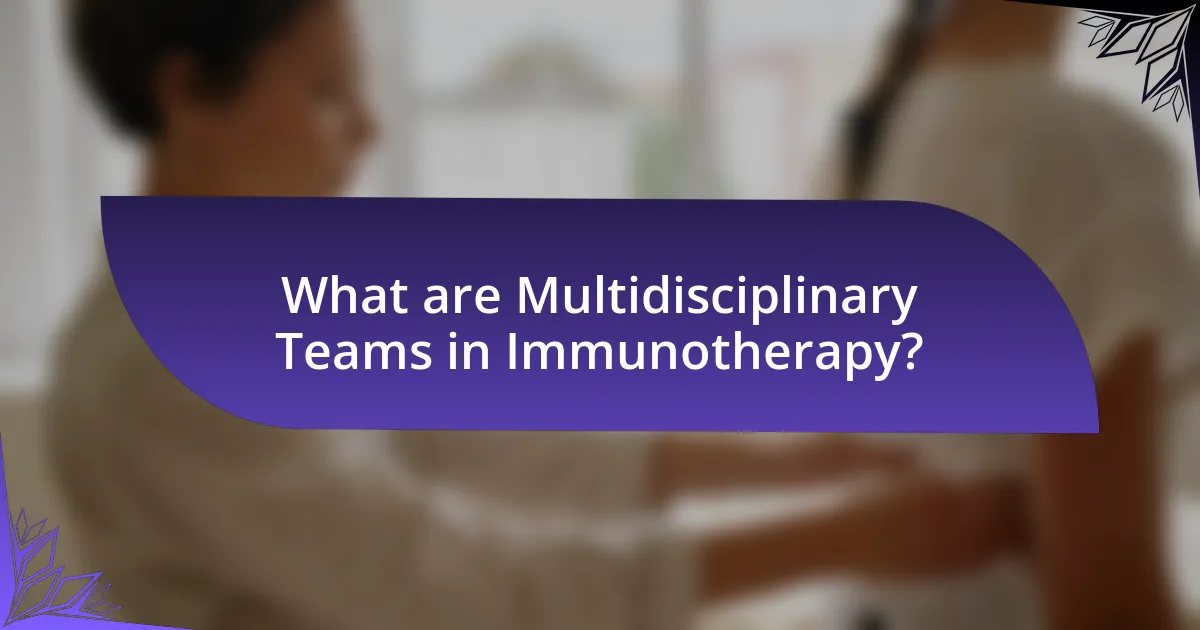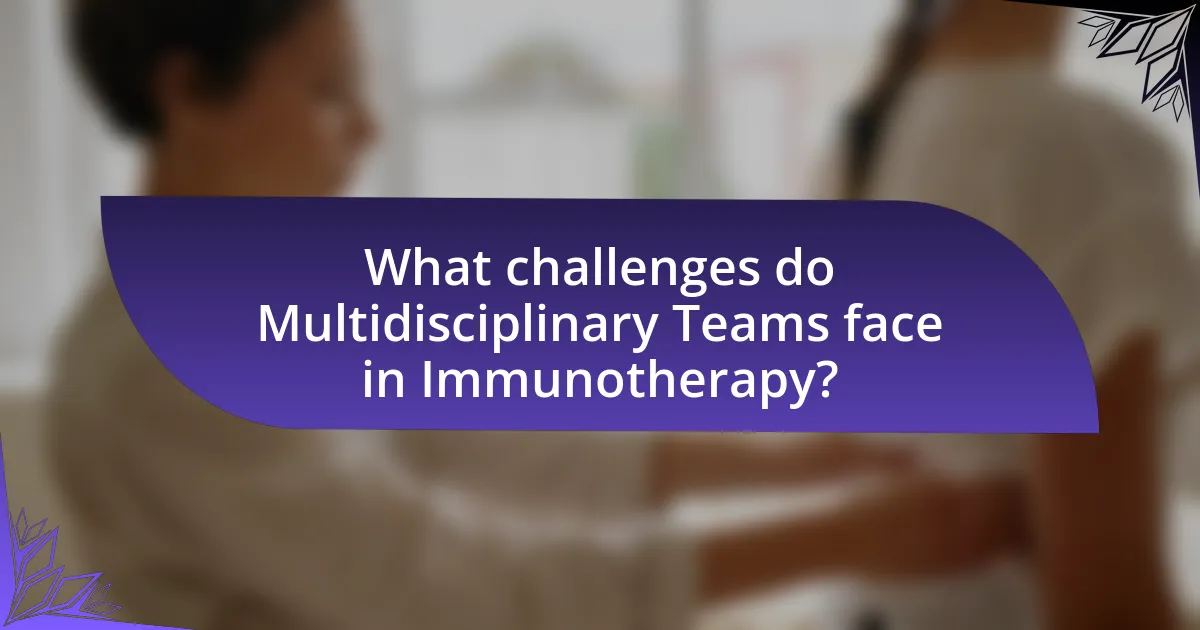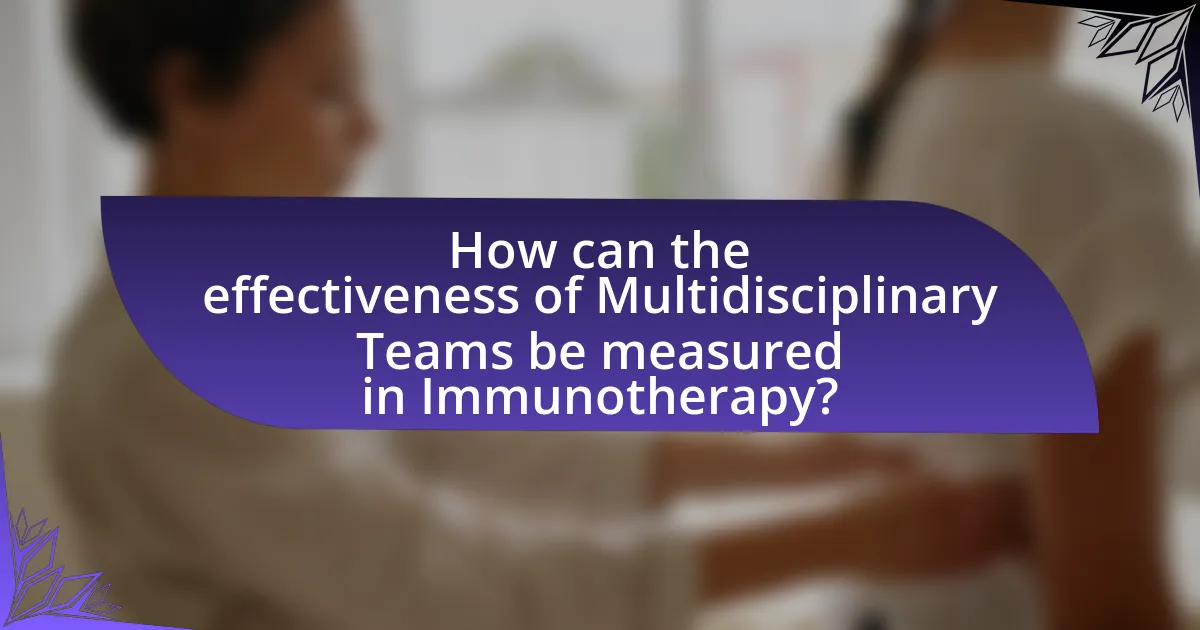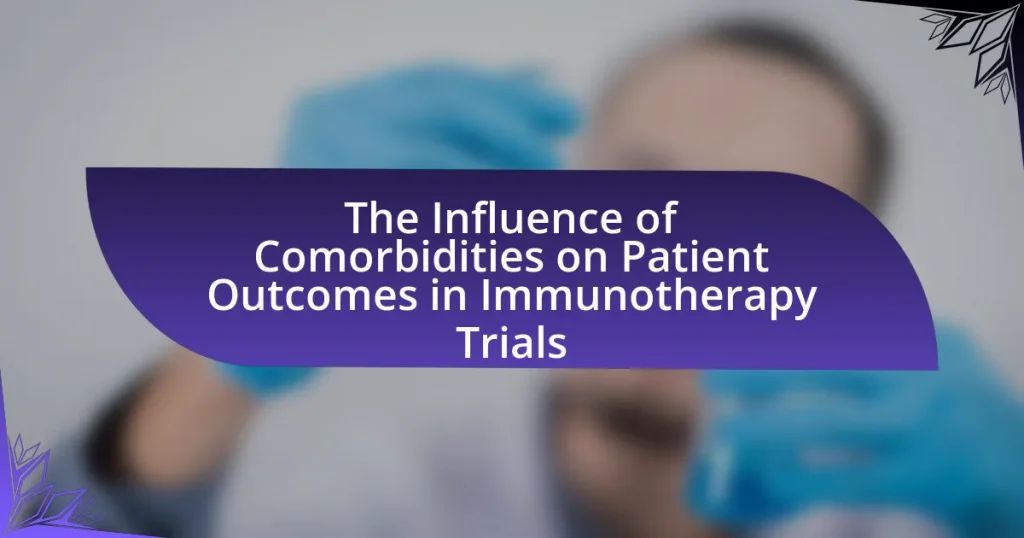Multidisciplinary teams in immunotherapy are collaborative groups of healthcare professionals, including oncologists, immunologists, nurses, and pharmacists, who work together to enhance patient care and treatment outcomes. This article explores the roles of various specialists within these teams, how they function to optimize treatment strategies, and the evidence supporting their effectiveness in improving survival rates and quality of life for cancer patients. Additionally, it addresses the challenges these teams face, such as communication barriers and misconceptions about teamwork, while highlighting best practices and practical steps healthcare organizations can take to foster effective collaboration in immunotherapy settings.

What are Multidisciplinary Teams in Immunotherapy?
Multidisciplinary teams in immunotherapy are collaborative groups of healthcare professionals from various specialties who work together to optimize patient care and treatment outcomes. These teams typically include oncologists, immunologists, nurses, pharmacists, and other specialists who contribute their expertise to develop comprehensive treatment plans tailored to individual patients. Research has shown that such collaborative approaches can lead to improved patient outcomes, as evidenced by studies indicating that multidisciplinary care in cancer treatment can enhance survival rates and quality of life.
How do Multidisciplinary Teams function in the context of Immunotherapy?
Multidisciplinary teams function in the context of immunotherapy by integrating diverse expertise to optimize patient care and treatment outcomes. These teams typically consist of oncologists, immunologists, nurses, pharmacists, and other specialists who collaborate to develop personalized treatment plans based on the unique characteristics of each patient’s cancer and immune response. Research indicates that this collaborative approach enhances decision-making, improves communication among healthcare providers, and leads to more comprehensive care strategies, ultimately resulting in better patient outcomes and increased survival rates. For instance, a study published in the Journal of Clinical Oncology found that multidisciplinary care in cancer treatment significantly improved overall survival compared to traditional care models.
What roles do different specialists play in a Multidisciplinary Team?
In a Multidisciplinary Team (MDT), different specialists play distinct and complementary roles that enhance patient outcomes in immunotherapy. Medical oncologists lead the treatment planning and management of cancer therapies, while immunologists provide expertise on immune system interactions and responses to therapies. Pathologists analyze tissue samples to confirm diagnoses and assess treatment efficacy, and radiologists interpret imaging studies to monitor disease progression. Nurses coordinate patient care and education, ensuring adherence to treatment protocols. Each specialist contributes unique knowledge and skills, facilitating comprehensive care that addresses various aspects of patient health, ultimately improving treatment effectiveness and patient quality of life.
How do these roles interact to enhance patient care?
Multidisciplinary teams enhance patient care by integrating diverse expertise to address complex health needs in immunotherapy. Each role, such as oncologists, nurses, pharmacists, and social workers, collaborates to create comprehensive treatment plans that consider medical, emotional, and logistical aspects of patient care. For instance, oncologists provide specialized knowledge on immunotherapy protocols, while nurses ensure effective administration and monitor patient responses. Pharmacists contribute by managing medication interactions and side effects, and social workers support patients’ emotional well-being and access to resources. This collaborative approach has been shown to improve treatment adherence and patient satisfaction, ultimately leading to better health outcomes, as evidenced by studies indicating that multidisciplinary care models can reduce hospital readmissions and enhance quality of life for cancer patients.
Why are Multidisciplinary Teams essential for patient outcomes in Immunotherapy?
Multidisciplinary teams are essential for patient outcomes in immunotherapy because they integrate diverse expertise to optimize treatment strategies. This collaborative approach ensures comprehensive patient care, addressing various aspects of treatment, including medical, psychological, and logistical needs. Research indicates that patients treated by multidisciplinary teams experience improved survival rates and better quality of life, as these teams can tailor immunotherapy regimens to individual patient profiles, monitor side effects more effectively, and provide holistic support. For instance, a study published in the Journal of Clinical Oncology found that multidisciplinary care in cancer treatment led to a 20% increase in overall survival compared to traditional care models.
What evidence supports the effectiveness of Multidisciplinary Teams in improving outcomes?
Multidisciplinary Teams (MDTs) have been shown to significantly improve patient outcomes in immunotherapy through enhanced collaboration and comprehensive care. Evidence from a systematic review published in the Journal of Clinical Oncology indicates that MDTs lead to better treatment adherence, reduced hospital readmissions, and improved overall survival rates in cancer patients receiving immunotherapy. Specifically, a study by Kesson et al. (2020) demonstrated that patients managed by MDTs had a 20% higher survival rate compared to those receiving standard care. Additionally, the integration of diverse expertise within MDTs facilitates personalized treatment plans, which are crucial for optimizing immunotherapy effectiveness.
How do these teams address the complexities of Immunotherapy treatments?
Multidisciplinary teams address the complexities of immunotherapy treatments by integrating diverse expertise to optimize patient care. These teams typically consist of oncologists, immunologists, nurses, pharmacists, and other specialists who collaborate to develop personalized treatment plans. For instance, a study published in the Journal of Clinical Oncology highlighted that such collaborative approaches lead to improved patient outcomes, as they allow for comprehensive assessments of treatment responses and management of side effects. This integration of knowledge ensures that all aspects of a patient’s health are considered, ultimately enhancing the effectiveness of immunotherapy.

What challenges do Multidisciplinary Teams face in Immunotherapy?
Multidisciplinary teams in immunotherapy face challenges such as communication barriers, differing professional perspectives, and coordination of care. Communication barriers arise from the diverse backgrounds of team members, which can lead to misunderstandings and hinder effective collaboration. Differing professional perspectives can create conflicts in treatment approaches, as each discipline may prioritize different aspects of patient care. Coordination of care is also a significant challenge, as managing patient information and treatment plans across various specialties can be complex and time-consuming. These challenges can impact the overall effectiveness of immunotherapy and patient outcomes.
How can communication barriers impact team effectiveness?
Communication barriers can significantly hinder team effectiveness by creating misunderstandings and reducing collaboration among team members. In multidisciplinary teams, such as those involved in immunotherapy, effective communication is crucial for sharing diverse expertise and ensuring cohesive patient care. Research indicates that poor communication can lead to increased errors, decreased morale, and ultimately, suboptimal patient outcomes. For instance, a study published in the Journal of Patient Safety found that communication failures were a contributing factor in 70% of sentinel events, highlighting the critical need for clear dialogue in healthcare settings.
What strategies can be implemented to improve communication among team members?
To improve communication among team members, implementing regular team meetings and utilizing collaborative tools is essential. Regular meetings foster an environment for open dialogue, allowing team members to share updates, address concerns, and align on goals. Collaborative tools, such as project management software and communication platforms, facilitate real-time information sharing and enhance transparency. Research indicates that effective communication within multidisciplinary teams can lead to improved patient outcomes in immunotherapy, as evidenced by a study published in the Journal of Clinical Oncology, which found that structured communication practices significantly enhanced team coordination and patient care quality.
How does team cohesion affect patient outcomes?
Team cohesion significantly improves patient outcomes by fostering effective communication and collaboration among healthcare professionals. When team members work cohesively, they are more likely to share critical information, leading to timely and accurate decision-making in patient care. Research indicates that high levels of team cohesion correlate with reduced medical errors and improved patient satisfaction scores. For instance, a study published in the Journal of Interprofessional Care found that cohesive teams in healthcare settings resulted in a 30% decrease in adverse patient events. This evidence underscores the vital role of team cohesion in enhancing the quality of care delivered to patients, particularly in complex treatment environments like immunotherapy.
What are the common misconceptions about Multidisciplinary Teams in Immunotherapy?
Common misconceptions about multidisciplinary teams in immunotherapy include the belief that these teams are solely composed of oncologists, that they operate without clear communication, and that their collaboration does not significantly impact patient outcomes. In reality, multidisciplinary teams encompass a diverse range of specialists, including immunologists, nurses, pharmacists, and social workers, all of whom contribute unique insights and expertise. Effective communication is a cornerstone of these teams, facilitating coordinated care that has been shown to improve treatment efficacy and patient satisfaction. Studies indicate that patients treated by multidisciplinary teams experience better clinical outcomes, highlighting the critical role of collaboration in immunotherapy.
Why do some healthcare professionals underestimate the value of teamwork?
Some healthcare professionals underestimate the value of teamwork due to a focus on individual expertise over collaborative approaches. This perspective often stems from traditional training that emphasizes personal achievement and autonomy, leading to a belief that individual skills are sufficient for patient care. Research indicates that effective teamwork can significantly enhance patient outcomes, particularly in complex fields like immunotherapy, where multidisciplinary collaboration is essential for addressing diverse patient needs and optimizing treatment strategies. Studies show that teams that integrate various specialties can improve decision-making and reduce errors, highlighting the critical role of teamwork in achieving better health results.
How can education and training help dispel these misconceptions?
Education and training can dispel misconceptions about multidisciplinary teams in immunotherapy by providing accurate information and fostering collaboration among healthcare professionals. Structured educational programs can clarify the roles and contributions of various specialists, such as oncologists, immunologists, and nurses, in patient care. For instance, studies show that interdisciplinary training improves communication and understanding of treatment protocols, leading to better patient outcomes. Additionally, ongoing training sessions can address evolving misconceptions by integrating the latest research findings, thereby ensuring that all team members are informed about the most effective practices in immunotherapy.

How can the effectiveness of Multidisciplinary Teams be measured in Immunotherapy?
The effectiveness of Multidisciplinary Teams (MDTs) in Immunotherapy can be measured through patient outcomes, treatment response rates, and overall survival rates. These metrics provide quantifiable evidence of how well MDTs collaborate to optimize treatment plans tailored to individual patient needs. For instance, studies have shown that MDTs can lead to improved patient survival rates, with a reported increase of 20% in overall survival for patients receiving care from such teams compared to those who do not. Additionally, the integration of diverse expertise within MDTs enhances the personalization of immunotherapy, leading to higher treatment response rates, which can be tracked through clinical trial data and patient registries.
What metrics are used to evaluate patient outcomes related to team collaboration?
Metrics used to evaluate patient outcomes related to team collaboration include patient satisfaction scores, clinical outcomes such as recovery rates, and readmission rates. Patient satisfaction scores, often gathered through surveys, reflect the quality of care and communication among team members. Clinical outcomes, such as the percentage of patients achieving treatment goals, provide direct evidence of the effectiveness of collaborative efforts. Readmission rates serve as an indicator of the continuity of care and the success of team coordination in managing patient needs post-discharge. These metrics collectively demonstrate the impact of multidisciplinary teamwork on patient health and overall experience in immunotherapy settings.
How do patient satisfaction surveys contribute to understanding team effectiveness?
Patient satisfaction surveys provide critical insights into team effectiveness by measuring patient perceptions of care quality and coordination among multidisciplinary teams. These surveys capture feedback on various aspects of the patient experience, such as communication, responsiveness, and overall satisfaction, which directly reflect how well team members collaborate and deliver care. Research indicates that higher patient satisfaction scores correlate with improved clinical outcomes and team performance, highlighting the importance of effective teamwork in delivering quality immunotherapy. For instance, a study published in the Journal of Clinical Oncology found that patient-reported outcomes significantly influenced treatment decisions and team dynamics, demonstrating that satisfaction surveys are essential tools for assessing and enhancing team effectiveness in healthcare settings.
What role does clinical data play in assessing team performance?
Clinical data is essential in assessing team performance as it provides measurable outcomes that reflect the effectiveness of multidisciplinary collaboration in patient care. By analyzing clinical data, healthcare teams can evaluate treatment efficacy, identify areas for improvement, and ensure adherence to best practices. For instance, studies have shown that teams utilizing clinical data to track patient outcomes can enhance decision-making processes, leading to improved survival rates and quality of life for patients undergoing immunotherapy. This data-driven approach enables teams to refine their strategies and optimize patient management, ultimately contributing to better health outcomes.
What best practices can enhance the performance of Multidisciplinary Teams in Immunotherapy?
Effective communication and collaboration are best practices that can significantly enhance the performance of multidisciplinary teams in immunotherapy. Establishing regular meetings and utilizing collaborative tools fosters open dialogue among team members, ensuring that diverse expertise is integrated into patient care. Research indicates that structured communication frameworks, such as SBAR (Situation, Background, Assessment, Recommendation), improve clarity and reduce misunderstandings, leading to better decision-making. Additionally, defining clear roles and responsibilities within the team helps streamline processes and enhances accountability, which is crucial in complex treatment scenarios like immunotherapy. Studies show that teams with well-defined roles experience improved efficiency and patient outcomes, as each member can focus on their specific contributions while supporting the overall treatment strategy.
How can regular team meetings improve collaboration and patient care?
Regular team meetings enhance collaboration and patient care by fostering open communication among multidisciplinary team members, which leads to more coordinated treatment plans. These meetings allow healthcare professionals to share insights, discuss patient progress, and address challenges collectively, thereby improving decision-making. Research indicates that effective communication in healthcare settings can reduce medical errors and increase patient satisfaction, as evidenced by a study published in the Journal of Interprofessional Care, which found that structured team meetings significantly improved collaborative practice and patient outcomes.
What training programs are beneficial for team members in Immunotherapy settings?
Training programs beneficial for team members in Immunotherapy settings include specialized courses in immunology, clinical trial management, and patient communication skills. These programs enhance the understanding of immune mechanisms and treatment protocols, which are crucial for effective patient care. For instance, the American Society of Clinical Oncology offers training that focuses on the latest advancements in immunotherapy, ensuring that healthcare professionals are up-to-date with current practices. Additionally, programs that emphasize teamwork and collaboration among multidisciplinary teams improve communication and coordination, leading to better patient outcomes. Research indicates that well-trained teams in immunotherapy settings can significantly enhance treatment efficacy and patient satisfaction.
What practical steps can healthcare organizations take to foster effective Multidisciplinary Teams in Immunotherapy?
Healthcare organizations can foster effective Multidisciplinary Teams in Immunotherapy by implementing structured communication protocols, establishing clear roles and responsibilities, and promoting continuous education and training. Structured communication protocols, such as regular team meetings and shared digital platforms, enhance collaboration and ensure all team members are aligned on patient care strategies. Clear roles and responsibilities help prevent overlap and confusion, allowing each specialist to contribute their expertise effectively. Continuous education and training keep team members updated on the latest immunotherapy advancements, fostering a culture of learning and adaptability. These steps are supported by research indicating that well-coordinated multidisciplinary teams improve patient outcomes in complex treatments like immunotherapy.



